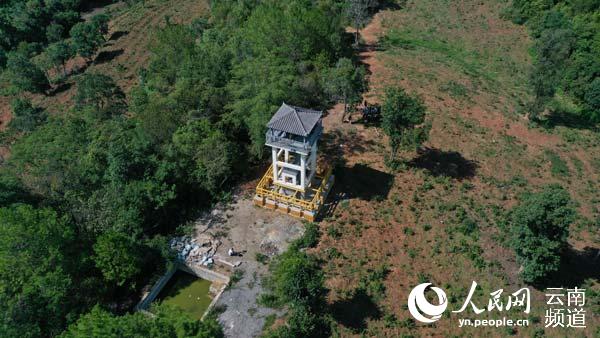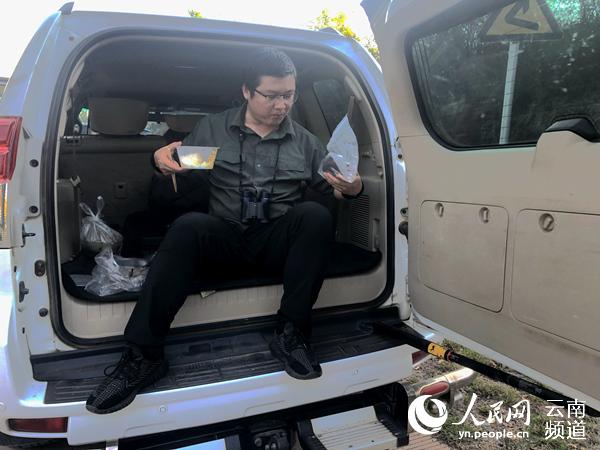Caregivers devote themselves to conservation of wild Asian elephants in SW China’s Yunnan
The population of wild Asian elephants, which are mainly found in southwest China’s Yunnan province and are under first-class state protection in the country, has risen from about 150 in the 1990s to nearly 300, indicating Yunnan’s enormous efforts to protect the environment and preserve biodiversity.

Photo shows Yang Zhongping. (People’s Daily Online/Chen Hao)
The achievement could not be possible without the valuable contribution of a group of elephant caregivers, who have been dedicated to the protection of the endangered species for years.
Among them is Yang Zhongping, a local Asian elephant inspector in Nanbanghe village, Liushun town, Simao district of Pu’er city in Yunnan, who has served on the post for four years.
With wild Asian elephants in Liushun, the local government has designated areas totaling 80 hectares to grow food such as bananas and corn for them to deter elephants from entering human settlements. China’s first Asian elephant observation tower is located in the food supply base dubbed “elephant canteens.”

Photo shows the Asian elephant observation tower in Liushun town, Simao district, Pu’er city, southwest China’s Yunnan province. (People’s Daily Online/Chen Hao)
Yang’s job is to monitor elephants on the observation tower and alert villagers to hide or evacuate if they approach. He also patrols the food supply base to determine the whereabouts of the animals by looking at their footprints, observing marks and smells.
“Elephants often visit the base,” Yang told People’s Daily Online, adding that he once found that 51 of the animals had shown up in the base.
Noting that the job is very risky, though the sun-tanned man said he has been chased by elephants several times, he hasn’t given up.
He once found a wild Asian elephant trapped in a water tank during a regular patrol and reported the case to the related department. Thanks to his prompt reaction, rescuers arrived and used an excavator to rescue the animal.
Hoping that what he is doing can help humans and elephants live in peace, Yang said, “I feel a strong tie with the elephants.”

Chen Fei. (Photo courtesy of the interviewee)
Another elephant caregiver is Chen Fei, director of the Asian elephant research center under the National Forestry and Grassland Administration, who has been engaged in the research of wild Asian elephants for about five years.
Since March 24, 34-year-old Chen has been monitoring the situation of a herd of wild Asian elephants wandering north from their forest home at the Xishuangbanna Nature Reserve in Yunnan.
When real-time monitoring showed that the animals might enter a school in Tongguan town, Mojiang county of Pu’er, Chen promptly headed to the school with staff from the city’s forestry and grassland bureau to discuss precautions.
Chen suggested the installation of protective fences near the school, which was adopted. Together with local officials and residents, Chen also tried to lead the animals in another direction with food.
Luckily, the elephants didn’t enter the campus but continued to march north toward areas in the city of Yuxi and Kunming. Chen had to continue his risky journey of following the herd to prevent human-elephant conflicts and monitor the animals’ health conditions.

Xiong Chaoyong and a rescued Asian elephant. (Photo courtesy of the interviewee)
Currently, he is monitoring some elephants that are lingering between Anning city and Jinning district under the jurisdiction of Kunming.
Different from Chen, Xiong Chaoyong is known as an “elephant dad” of a 19-year-old female Asian elephant named Ranran at the Asian Elephant Breeding and Rescue Center in Xishuangbanna. Xiong has been working as an elephant caretaker for years to rescue and look after wild Asian elephants at the center that has rescued more than 20 Asian elephants since its establishment.
In 2005, learning that an elephant had been seriously injured, Xiong joined the other 80 members of the rescue team and went to Xishuangbanna, where he met Ranran for the first time.
The rescue team calmed Ranran down with anesthesia. However, for a long time, Ranran refused to cooperate with the treatment. After Xiong buying apples and bananas to feed her for two months to help improve her health condition, Ranran finally began to improve. In the following months, Xiong treated the elephant with lots of patience.
Due to Xishuangbanna's tropical climate, the center is always hit by heavy rain and thunder. Xiong moved his bed to a makeshift shed to watch over Ranran at night. Whenever she was frightened by the thunder, he would run up next to her, touch her gently, talk with her and sing to her to help her calm down.
Treating Ranran as his own child over the years, Ranran always followed Xiong wherever he went. On Sept. 21, 2018, Xiong became an “elephant grandpa” when Ranran’s baby was born.
After Ranran made a full recovery, Xiong started to train her survival skills so that one day the center can return the elephant to the wild.
Photos
Related Stories
- Elephant calf caught on camera suckling milk during migration in Yunnan
- China's migrating elephant herd travels further south
- China's migrating elephant herd travels southwards
- China's migrating elephant herd heads 9.3 km further north
- Migrating elephants linger in Dalongtan Township, SW China
- Asian elephants’ Sweet home in Yunnan
- Zooming into the life, habitat of China's wandering elephants
- Primary school ensures it's now elephant-proof
- China's migrating elephant herd shows returning trend
- Two elephant calves play-fight in Yunnan
Copyright © 2021 People's Daily Online. All Rights Reserved.










